With their countries facing an Ebola epidemic of "unprecedented" proportions, the health ministers of 11 African nations have agreed to a joint strategy to try to stem its deadly advance.
As part of the plan, the World Health Organization will set up a "sub-regional control center" in Guinea -- one of the three West African nations at the heart of the outbreak -- to help coordinate the response.
The strategy was announced late Thursday at the end of a two-day summit in Ghana that brought together ministers from the Democratic Republic of the Congo, Gambia, Ghana, Guinea, Guinea-Bissau, Ivory Coast, Liberia, Mali, Senegal, Sierra Leone and Uganda with health experts, Ebola survivors and WHO representatives.
It also calls for better surveillance and reporting of cases, the mobilization of community and political leaders to improve awareness and understanding, and greater cross-border communication.
WHO has previously warned that "drastic action" is needed to halt the spread of the virus, which can kill up to 90% of those infected.
Addressing the closing session, Dr. Luis Gomes Sambo, WHO regional director for Africa, welcomed the move.
"It's time for concrete action to put an end to the suffering and deaths caused by Ebola virus disease and prevent its further spread," he said.
WHO reports there have been 759 cases, including 467 deaths, in Guinea, Sierra Leone and Liberia as of June 30.
 Enormous' impact
Enormous' impact
The impact of the outbreak, which began in March, "has been enormous in terms of loss of human lives and negative socioeconomic effects," Sambo said.
The disease's spread "is in great extent associated with some cultural practices and traditional beliefs" that run counter to preventive health measures, he said.
According to a WHO statement, such traditional practices foster "mistrust, apprehension and resistance" in local populations regarding health workers' efforts.
These include the hiding and treatment at home of Ebola victims, and funerals at which mourners touch the body of the deceased.
"These are very high-risk practices leading to extensive exposures to Ebola virus in the community," the statement said.
Sambo added, "The extensive movement of people within and across borders has facilitated rapid spread of the infection across and within the three countries."
Fighting Ebola in urban Africa
He also paid tribute to those on the front lines of the fight against the deadly disease, saying health workers have been "disproportionately affected," with more than 60 cases and 32 deaths reported among their ranks.
Latest Stories
-
How Ghana’s Prince Anthony is transforming diaspora tourism in Africa
6 minutes -
Reflo’s, The Florence Mensah Foundation distribute sanitary pads to girls in Ashaiman, Nima and Ochiso
10 minutes -
Accra hosts IPRA Conference & Awards for the first time
14 minutes -
Asantehene was instrumental in me becoming Prof Mills’ running mate – Mahama reveals
16 minutes -
Otumfuo warns of unrest if Ghana’s mining gains stay overseas, urges gold markets to invest in local industry
21 minutes -
UMaT associate professor alleges breaches of University statutes, petitions GTEC to act
27 minutes -
Harnessing Pan-African Potential: The Role of the Pan African AI Summit in Shaping Africa’s Digital Future
27 minutes -
Mahama reaffirms commitment to strengthening chieftaincy institutions
29 minutes -
CFAO partners with Lovol to power Ghana’s heavy equipment market
55 minutes -
‘I don’t know what you call rich’ – Bryan Acheampong on support for Wontumi’s GH¢50m bail
1 hour -
Dr. Who? Ghana’s Epidemic of Degrees without Diagnosis: Satirical Musings on Ghana’s Curious Obsession with Titles
1 hour -
Glaucoma Laser treatment launched at St. Thomas Eye Hospital
1 hour -
Hindsight: What does the law say about Nations FC’s walk-off?
1 hour -
Mahama outlines the bold vision behind establishment of the GoldBod
1 hour -
Highway robbers make off with over 1.7 million CFA, jewellery, and phones at Gomoa Potsin
1 hour

